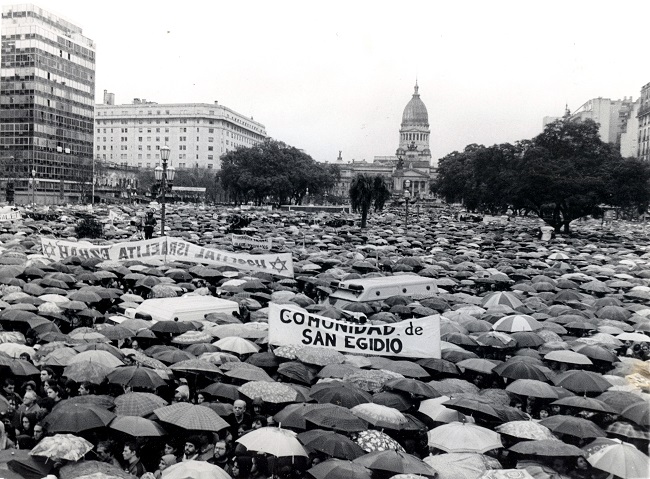This Thursday, July 18, it will be 25 years since the AMIA bombing. Eighty-five women, men and teenagers died that day; more than 300 were injured. Since then, despite the grandiose speeches, the bombing remains unpunished: no truth, no justice.
This is no mere accident: years of cover-up and impunity for the bombing were made possible by a political, judicial and intelligence structure. This complex scheme has still not been entirely unraveled and its worst aspects have become more accentuated in recent years.
Over more than two decades, a group of family members and victims belonging to Memoria Activa and other groups have fought for memory, truth and justice, nearly always on their own. The diversion of the investigation led to the nullification of the only trial for the bombing in 2004. It was not until 2019 that the judiciary confirmed that the investigation was, from the beginning, shaped by geopolitical interests other than the identification and sanctioning of the perpetrators.
Twenty-five years later, the government has taken up the case as an instrument to show the international community that the country is aligned in the “fight against terrorism,” which could have very serious consequences. Invoking the memory of the victims, the Executive Branch is actively aiming to define a strategic alignment with the United States and Israel with regard to the Middle East. This is a decision that submerges Argentina in a scenario it does not control, and that it enters as the weakest participant. This position on the international stage has no correlation with the actions required in terms of justice and intelligence to end the impunity and unravel the cover-up. Moreover, this same government undid some of the few steps that had been taken, albeit tardy, in this sense.
A quarter century after the bombing, and similarly to what occurred in 1994, the Argentine government is overacting international alignments to avoid being questioned on its failure to produce concrete results.
International non-compliance
Memoria Activa resorted to the international system of human rights protection on July 16, 1999, with our sponsorship. On July 12, 2005, the Argentine State acknowledged its international responsibility for the violation of the right to life and justice, and formalized its commitments to a possible amicable solution under Decree 812/2005. This process was cut short.
After 25 years, there has been no State compliance in the case for:
1) Failure to investigate the bombing.
2) Failure to investigate the cover-up.
3) Failure to make reparations to victims.
4) Failure to make institutional reforms, including the system of intelligence, committed to under Decree 812/05.
In this context, the Inter-American Commission on Human Rights would be in a position to rule international responsibility for the human rights violations acknowledged by the State and submit the case to the Inter-American Court of Human Rights.
System of intelligence
Since taking power, the government of Mauricio Macri has, as a result of its alignment with the agenda of the United States and Israel, promoted the bombing being tried elsewhere and cast doubt that there ever was a politically motivated cover-up. On in internal level, the Minister of Justice has lent his support to persons actually sentenced for their role in such maneuvers and the government has repeatedly used the signing of the Memorandum with Iran to sway public attention in that direction. In recent days, it was also announced that the government will produce a list of organizations and persons identified as terrorists.
The diversion of the investigation into the bombing set a precedent for the worst judicial practices – practices that distort due process and politicize criminal cases with intelligence and media operations. The court that tried the cover-up confirmed that there were identical cases, secret files, unsupported intelligence information, false or extorted affirmations of repentance, illegal payments and arbitrary detentions.
But the scheming behind the AMIA case is still present and explains many of the problems that concern us today. The pacts between the judicial, political, intelligence and media sectors that built the impunity around the bombing have never been broken, nor have ways of doing things been transformed. Thus, after all these years, the secret persists and lack of oversight of funds reserved for intelligence operations prevails, as does the behind-the-scenes agreement that sustains the ties between the federal justice system and intelligence networks.
The commitment to truth, memory and justice demands that these pacts finally be broken.
Commitments
On Thursday, July 18 at 9.30 a.m., the family members of Memory Activa will convene a public event in Plaza Lavalle in front of Tribunales (Federal Courthouse). Like 25 years ago, they ask that the State comply with its obligations to investigate the truth and punish those responsible. For 25 years, they’ve also been seeking something else: commitment by all, society and the political system, for such impunity to never again be possible.
25 years without justice for the AMIA bombing
The scheming behind the AMIA case is still present and explains many of the problems that concern us today. The pacts between the judicial, political, intelligence and media sectors that built the impunity around the bombing have never been broken, nor have ways of doing things been transformed.

